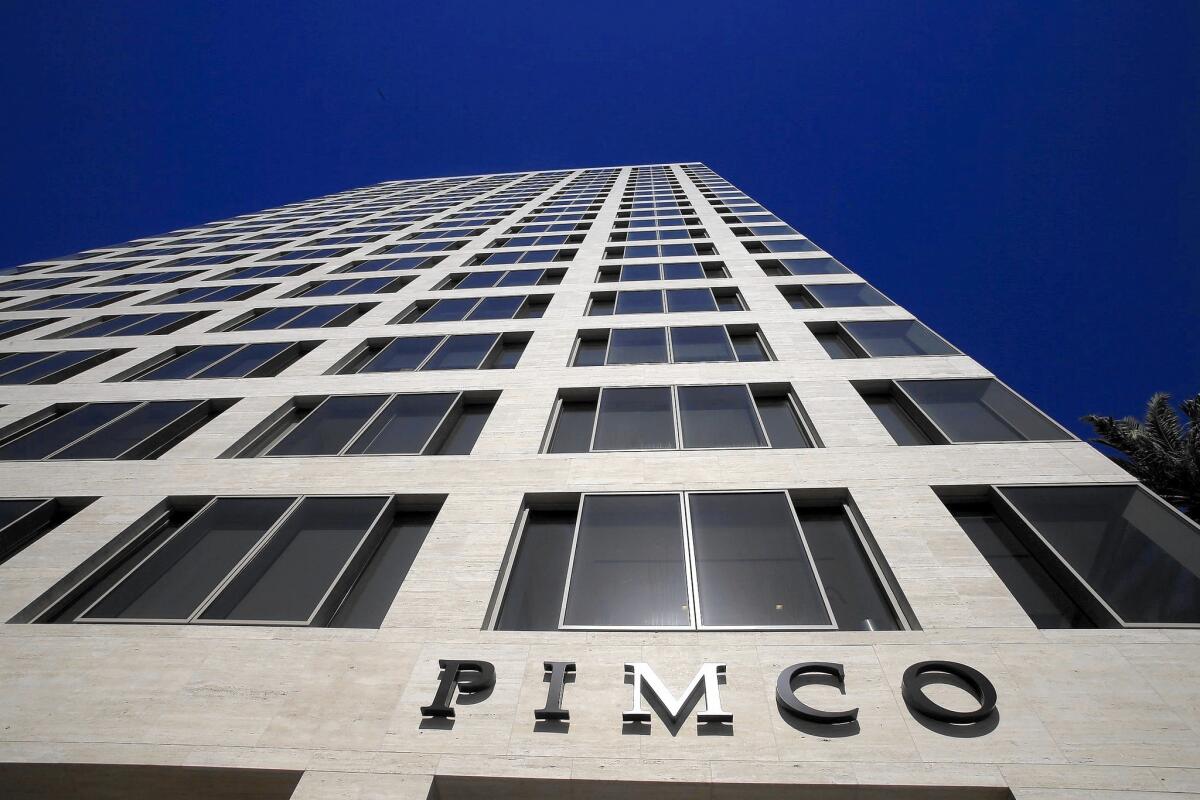Bond fund giant Pimco has $150.3 billion in outflows in 2014

Investors withdrew a record $150.3 billion from bond fund giant Pacific Investment Management Co. last year, lashing back against weak performance at the flagship Pimco Total Return Fund as well as management turmoil.
The outflows from the Newport Beach money manager were the largest annual decline in assets ever recorded by a mutual fund family, said Alina Tarlea, a senior analyst for fund tracker Morningstar Inc. in Chicago.
Investors withdrew a net $102.9 billion from Pimco Total Return, leaving it down more than 40% on the year at $143.4 billion, according to Morningstar estimates released Tuesday. The fund peaked at nearly $293 billion in early 2013.
The retreat came mostly after co-founder Bill Gross, the chief investment officer who had built the firm into the world’s largest fixed income money manager, quit near the end of September amid reported infighting.
Gross managed the Total Return Fund as well as the Pimco Unconstrained Bond Fund, which lost $15.9 billion, or 58% of its assets, to close out the year at $11.5 billion.
Gross, whose colorful remarks and investment genius had earned him the nickname “the bond king,” delivered decades of superior returns.
He and his heir-apparent, Mohamed El-Erian, Pimco’s chief executive and co-chief investment officer, were financial celebrities sought by business news outlets to opine on such topics as bond prices, the Federal Reserve, the U.S. economy and global megatrends.
But El-Erian abruptly departed last January after clashing with Gross, shaking the confidence of investors. Gross departed just as abruptly after additional clashes with other Pimco executives who had sought to restrict his role — or force him out.
“Had there been a reasonable way to continue there, I would have stayed to my last breath,” Gross wrote in a letter to investors in his new firm, Janus Capital. “But slowly, and with great hesitation, I came to understand that it was time for me to leave.”
Pimco had nearly $1.9 trillion under management at the end of September, mostly in private investment accounts that are hard to track. Tarlea said Morningstar monitors the firm’s widely traded mutual funds and other public accounts, in which outflows amounted to about 28% last year, dropping the total to $378.3 billion from $528.5 billion a year earlier.
In an effort to stem the outflow, Pimco has re-hired high-profile money managers and promoted standouts from its deep bench of investment professionals to run its largest funds. Pimco Total Return is now headed by three investment stars.
The firm didn’t respond to requests Tuesday for comment on the fund outflows and its strategy to reverse them. But in a statement Friday announcing the shrinking assets at Total Return, Pimco sought to reassure investors that all was well.
“The fund’s experienced portfolio management team remains focused on pursuing investment opportunities designed to play out over the medium and long-term, while retaining a focus on capital preservation and liquidity for shareholders,” spokesman Dan Tarman said.
From a 10-year perspective, Pimco Total Return has richly rewarded investors, outperforming 96% of all comparable bond funds, Morningstar data show. The fund’s annual return averaged 5.99% during that period, compared with 4.71% at a Barclays bond index used as a benchmark — a huge difference in the bond world, where investors calculate wins in fractions of percentage points.
More recently, though, its performance has been spotty. It started with Gross’ misplaced bet in 2011 that investors would dump U.S. Treasury securities because of the nation’s financial troubles. Treasuries rallied instead, leaving Pimco Total Return with such a poor record for the year that Gross had to apologize to investors.
Last year, Pimco Total Return performed better than just 29% of rivals, Morningstar said. In December, the third month for the trio of Pimco executives now running Total Return, the fund had a negative return and bested only 13% of its competition, compared with a slight positive return at the benchmark index.
Morningstar’s Tarlea said bond investors know that month-to-month fluctuations in results can be deceiving. She said the “uncommonly large” withdrawals from Total Return — $70 billion in the last four months, including more than $18 billion in December — seemed “more an issue of overall investor confidence than short-term performance.”
The defections may stem in part from a trend that set in during the financial crisis, Tarlea said: Investors are turning away from active money managers, many of whom failed to anticipate both the downturn and the market’s powerful rebound.
These investors instead are loading up on low-cost index funds that own whole slices of the market instead of trying to beat it.
The trend, most pronounced in stocks, also has been seen in bond funds. Indeed, Pimco Total Return, once the world’s largest bond fund, now comes in fourth behind three index funds from Vanguard Group Inc.
Mark Wilson, chief investment officer at Newport Beach wealth manager Tarbox Group, said the Total Return Fund has had “plenty of short-term periods of underperformance” while enjoying its success over the long term. The core team of managers remains in place and the strategy hasn’t changed, he said.
“Even with this recent underperformance, the fund outperformed 67% of its peers over the last three years,” Wilson said. “I wouldn’t count out Pimco yet.”
Twitter: @ScottReckard







